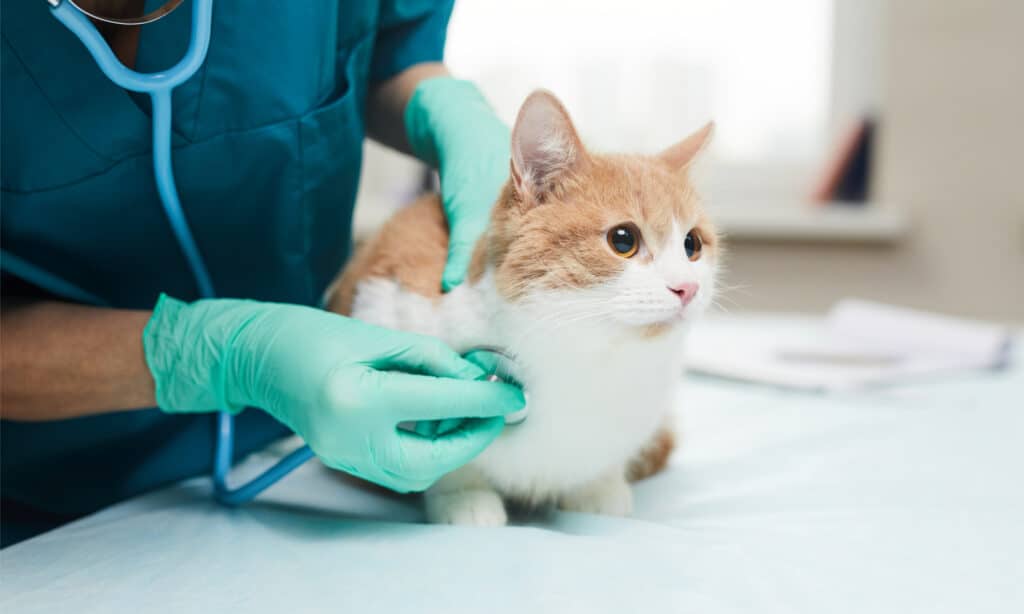Have you ever enjoyed a bowl of delicious grapes, only to look down and see your cat staring up at you with interest? Many have heard of the dangers associated with dogs eating grapes, but are unaware of how this fruit impacts cats. So, is it safe to give your cat a grape?
We may not often hear about grape toxicity in cats, but grapes are very dangerous for our feline friends! In this article, we discuss why grapes are toxic to cats, how many grapes a cat can eat, and what to do if your cat eats a grape.
Let’s get started!
Can Cats Eat Grapes?

Grapes are considered toxic to both dogs and cats!
©iStock.com/darrenplatts123
Unfortunately for any fruit-loving felines, grapes are highly toxic to cats. Grapes have been known to cause kidney damage, with some cats even experiencing complete kidney failure. Research around grape toxicity is more abundant in dogs. However, there are still many reports of cats becoming gravely ill after consuming grapes.
Why Are Grapes Dangerous for Cats?
After 20 years of research on grape toxicity in pets, experts believe they have found the reason why grapes are poisonous to cats and dogs. The toxic component found in grapes is likely a substance known as tartaric acid. Each grape can contain a different concentration of this substance.
The concentration of tartaric acid in grapes can range from 0.35% to 2% per grape. This means that when a cat consumes a grape, it is impossible to know how much toxin they are getting. This is likely why some pets appear to be fine after eating grapes, while others develop severe illness.
Can Cats Eat Raisins?
Grapes are toxic to cats, so this means raisins are toxic as well. Some veterinarians even believe that raisins could contain a higher concentration of tartaric acid than standard grapes. This makes them even more dangerous to our feline friends. When in doubt, it’s best to keep any forms of grapes away from your cat.
Cats should not eat grapes, raisins, grape jams, grape juices, or any other forms of grapes.
Can Just One Grape Make My Cat Sick?
As we mentioned above, the toxicity of each grape can vary. While some grapes contain a low concentration of tartaric acid, others may be highly concentrated. This means that it is virtually impossible to know just how toxic each individual grape is. Because of this, it is best to keep them away from your cat altogether.
So, what about if your cat accidently eats one grape? To be safe, we always suggest taking your cat to the vet the moment you suspect he ate a grape.
My Cat Ate a Grape – What Should I Do Now?
We always suggest taking your cat to the vet immediately if you think your kitty may have eaten a grape. Your vet can safely induce vomiting if your cat ate the grape within the last few hours. They can also offer skilled guidance on what to do next.
While dog owners can induce vomiting at home with hydrogen peroxide, this is not a safe option for cats. According to the Pet Poison Helpline, hydrogen peroxide is highly irritating to a cat’s esophagus and digestive tract. Hydrogen peroxide can cause severe inflammation and ulcerations in cats, so it is never worth the risk. Your vet can administer an injectable medication that will cause your cat to vomit without any risks.
Signs Of Grape Toxicity in Cats

We always suggest taking your cat to the vet immediately if you think they may have eaten a grape.
©iStock.com/AnnaStills
Symptoms of grape toxicity in cats can develop within 12 to 72 hours of the grape’s consumption. Here is a list of symptoms to be on the lookout for:
- Lethargy
- Decreased appetite or anorexia
- Vomiting
- Diarrhea
- Drooling
- Excessive thirst
- Abdominal pain
- Muscle tremors and seizures
We highly suggest bringing your cat to the vet if she develops any of the above symptoms. Grape toxicity in cats can be fatal, so it is essential to seek immediate care.
How Is Grape Toxicity Treated in Cats?
If you have to take your cat to the vet after eating a grape, you may be nervous about what lies ahead. Here’s an idea of what to expect:
Your vet will start by performing a physical exam, as well as asking about any symptoms. This will help them determine just how aggressive they need to be. Next, your vet will likely suggest performing blood tests to search for any evidence of kidney damage. Blood tests are essential even if your cat has not developed any symptoms, as it can take up to 72 hours for physical signs of kidney damage to develop. Cats with kidney failure often do not display obvious symptoms until they have lost 75% of their kidney function.
The next steps will vary based on how many grapes your cat ate, as well as if blood tests indicate kidney damage. If you brought your cat in immediately and tests are normal, then your vet may suggest an outpatient approach. This may involve medication to detoxify the digestive tract, fluids to help dilute toxins, and repeat blood tests in 24 to 48 hours. If all is well at the 48-hour mark, your little one may be in the clear.
However, if your cat could have been exposed to high doses of tartaric acid, or blood tests are abnormal, your vet will likely suggest keeping your cat in the hospital on IV fluids. Fluids will support the kidneys as they flush out toxins, as well as prevent long-term damage. Your vet will then repeat the blood tests every 24 hours to make sure kidney values are improving.
We recommend trusting your vet’s guidance.
My Cat Ate a Grape but Seems Fine – Is Vet Care Needed?
As we mentioned above, it can take up to 72 hours for symptoms of a grape toxicity to develop in cats. Waiting until your cat has developed symptoms will only increase risk of developing a more severe kidney injury. By bringing your cat to the vet the moment you are aware of grape ingestion, you are increasing her chances of a full recovery.
Bringing your little one to the vet immediately can also offer you peace of mind. Accidents happen all the time, but swift vet care can decrease the risk of serious complications. Your vet will offer you the necessary tools to best care for your kitty over the next 72 hours.
Final Thoughts
Grapes can lead to serious illness in our beloved cats and dogs. We always suggest keeping any grapes or raisins in an area your pet cannot access, and seeking urgent vet care if your little one accidently consumes one.
Be sure to review the information we discussed about the dangers of grapes in cats, and you can better understand this common pet toxin moving forward!
The photo featured at the top of this post is © PRESSLAB/Shutterstock.com
Thank you for reading! Have some feedback for us? Contact the AZ Animals editorial team.






